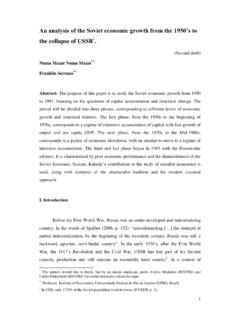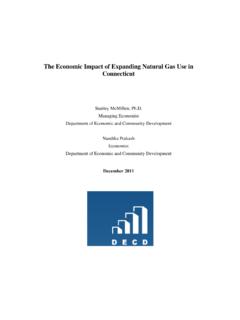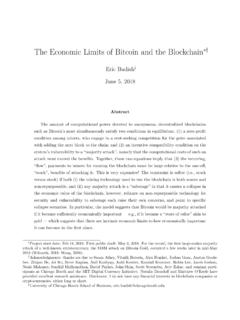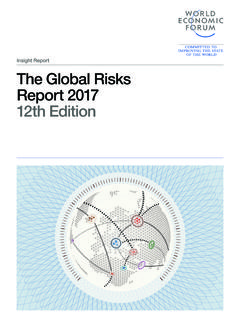Transcription of Fisheries Depletion and Collapse - IRGC
1 1 *This case study accompanies the IRGC report Risk Governance Deficits: An analysis and illustration of the most common deficits in risk governance . Fisheries Depletion and Collapse By Kjellrun Hiis Hauge, Belinda Cleeland and Douglas Clyde Wilson1 The scope of human dependence on marine life is significant, both in terms of the nutritional value provided by fish and other seafood to populations (especially in the developing world) and in terms of the level of economic security the fishing industry provides for coastal communities. Marine biodiversity, in itself, also offers tangible benefits to society, via revenues earned from tourism as well as by providing useful ecosystem services, such as the maintenance of water quality [Stokstad, 2006]. Currently, however, about 25% of world fish stocks are overexploited or fully depleted and overcapacity in fishing fleets is the norm rather than the exception [FAO, 2007:29].
2 Indeed, many experts agree that the exploitation limit of marine resources has been reached, if not exceeded, and that this overcapacity of fleets, excessive fishing quotas, illegal fishing practices and the generally poor management of most Fisheries are to blame [Rebufat, 2007:5-6]. The complete Collapse of large, profitable Fisheries such as the Californian sardine fishery in the 1950s, the Atlanto-Scandian herring fishery in the late 1960s, the Peruvian anchovy fishery in 1972, the Northern cod fishery off the East coast of Canada in 1992 and the North Sea cod fishery over the last decade have acted as clear warning signs that fishing practices in many parts of the world are unsustainable and that there are serious governance deficits evident in the management of fish stocks. Although we concentrate here on overfishing as a cause of Fisheries Depletion and Collapse , the Depletion of global fish stocks cannot be attributed to fishing alone.
3 Habitat destruction, pollution, climate change and invasive species also have an impact upon fish populations. Also, a changing environment affects stock abundance, and some stocks experience Collapse from environmental causes alone. In many instances, it is quite difficult to determine the main causes of the Depletion of fish stocks. Overview of the risk issue Until the late 19th century, the fish resources of the world s vast oceans were thought to be essentially inexhaustible, even by the most prominent biologists [Smith, 1994]. As the fishing industry expanded and technology made larger catches possible and more areas of the ocean exploitable, the received wisdom that Fisheries were inexhaustible soon became discredited. FAO estimates that 25% of the world s fish stocks are currently being fished at an unsustainable level [FAO, 2007:29], thus risking Collapse .
4 Fish are a common pool resource, meaning that it is difficult to exclude users and that exploitation by one user reduces the resource availability for others [Ostrom et al. 1999]. Common pool resources are found when a system of individual property rights is insufficient for sustainability or too costly to implement [Bromely, 1991]. Furthermore, in many cases, especially in long-distance Fisheries and in developing countries, they are effectively an open access resource, meaning that a system of property rights is completely absent and thus the fish can be caught by anyone. When common pool resources are valuable and open access, overexploitation is inevitable because users have no incentive to conserve when the fruits of such conservation can simply be 1 Kjellrun Hiis Hauge, Institute of Marine Research, Bergen, Norway; Douglas Clyde Wilson, Senior Researcher and Research Director at Innovative Fisheries Management, Aalborg University; Belinda Cleeland, project officer, IRGC.
5 2taken by another user. The outcome of such a situation is overfishing and eventual Collapse . This is why management is required if fish are to be harvested in a sustainable and economically efficient manner. Because Fisheries are common pool resources they are often owned and managed as common property by governments or other collective entities. These entities seek to avoid the commons dilemma by granting conditional rights of access, for example a fishing license or a rule that only certain fishing techniques can be used. Although it is a common mistake, common property should never be confused with open access because common property regimes involve these access rights. However group-level management arrangements are challenging and costly, and often require the development of complex management systems.
6 Over the past century, the management of Fisheries commons has developed around the central concept of maintaining a sustainable yield of fish stocks [Hannesson, 2008:14]. The sustainable yield of fish stocks has important implications well beyond Fisheries . Capture Fisheries are one of the most environmentally benign sources of animal protein in the human food supply system, and they have a very important potential for shrinking the overall environmental footprint [Wilson, 2009]. Fish have the highest protein content in their flesh of all food animals, and no other food animal converts feed to body tissue as efficiently as fish [Smil, 2000]. Capture Fisheries have the potential to have the lowest ecological impact of all sources of animal protein because they do not generate the waste and disease problems found in both terrestrial and aquatic animal husbandry.
7 If the dilemma described in the last paragraph is resolved through effective management, the rate of fishing would slow to allow stocks to recover and produce new fish at a higher rate than they do in their currently depleted state. This would mean higher catches from a lower fishing effort. The lower effort implies lower energy use and other environmental impacts from fishing. The higher catches imply a reduction of the price of fish products and a shifting of protein consumption to capture Fisheries from more environmentally damaging sources. This in turn would mean a reduction in the overall human pressure on the environment. Risks related to overfishing: global food security Fish provide more than 20% of the animal protein consumed by billion people in developing countries (up to 50% for some nations) and is an important source of micronutrients, essential fatty acids, proteins and minerals.
8 Due to this nutritional importance of fish for so many people, a large-scale Collapse of Fisheries or a significant increase in the price of fish products (likely to be the result of smaller catches) could seriously affect the nutritional status and the food security of many populations [World Bank 2005:6]. Overfishing does not only reduce the source of food today. If overfishing and other negative human impacts on the oceans continue, ecosystems can be driven to irreversible states of decline and this may affect the food supply for future generations. economic security Harvesting fish in an unsustainable manner also means harvesting them inefficiently. When we put fish stocks at risk we also put at risk the economic welfare of millions of people dependent on marine products. Tourism is an important source of income in some countries, where the vibrant aquatic life (around coral reefs, for example) attracts divers, sports fisherman and other visitors.
9 Income generated by tourism could be lost if Fisheries are depleted and marine biodiversity is lost. More substantial, however, is the importance of fish exports for developing economies. Indeed, there is a direct link between overfishing and poverty. Approximately half of the total export value of the world trade in fish and Fisheries products (US$ billion in 2004) comes from developing countries. Poverty among coastal communities in developing countries is often high (especially in Asia and Africa), and fishing industries help alleviate this, employing 150 million people and 3 providing a last resort livelihood for the poor. The Collapse of Fisheries can thus have devastating economic impacts for developing countries, as well as for countries whose trade in fishery products makes up a large percentage of their total merchandise exports (Greenland and Iceland, for example) [World Bank, 2005:4-5 and 7].
10 Coastal settlement Excess fishing capacity and depleted fish stocks cause problems for coastal communities that depend on the fishing industry and eco-tourism. Such devastation of coastal settlements can also result in the loss of cultural value. Problems can be fortified in cases where rights to fish can be traded and quota shares become concentrated in fewer hands. The introduction of individual transferable quotas in Iceland contributed to the marginalisation of Fisheries dependent coastal communities, due to quota concentrations [P lsson & Helgason, 1995]. biological diversity and ecosystem stability Overfishing poses serious risks as the loss of marine biological diversity can have serious consequences for the stability of marine and coastal ecosystems. Biological extinction from a directed fishing effort is extremely rare because economic extinction ( , the fish becoming too rare to fish profitably) usually happens well before biological extinction.









